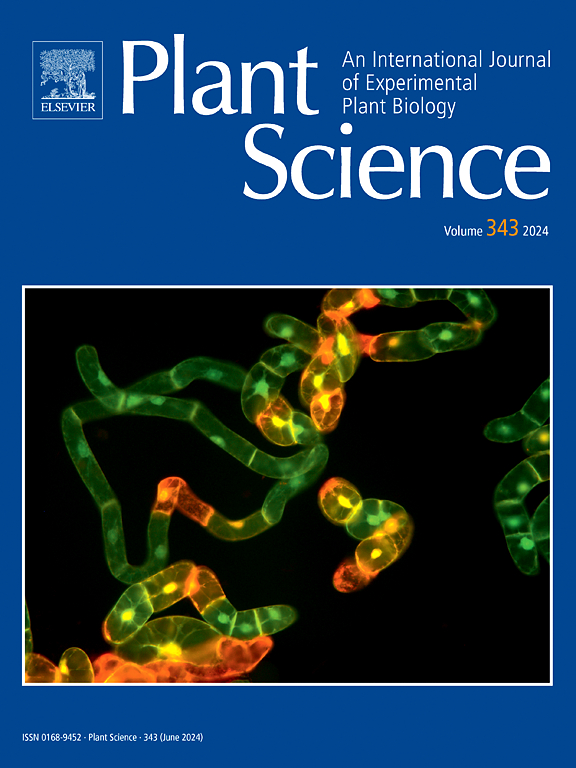类胡萝卜素:推动类胡萝卜素研究的资源、知识和新兴工具。
IF 4.2
2区 生物学
Q2 BIOCHEMISTRY & MOLECULAR BIOLOGY
引用次数: 0
摘要
类胡萝卜素是一大类异戊烯化合物,由植物、藻类以及某些真菌、细菌和昆虫生物合成。在植物中,类胡萝卜素在光合作用和光保护中起着至关重要的作用。此外,类胡萝卜素还是类胡萝卜素的前体,类胡萝卜素是通过酶和非酶裂解反应生成的。类胡萝卜素包含多种化合物,包括激素、生长调节剂和信号分子,它们在与植物发育、胁迫反应和植物-有机体相互作用相关的途径中发挥着重要作用。类胡萝卜素生物合成的调节间接影响了类胡萝卜素的形成以及对目标途径的生物活性作用。最近发现的大量具有生物活性的新类胡萝卜素增加了人们对扩大类胡萝卜素功能和调控知识的兴趣。在本综述中,我们将深入探讨类胡萝卜素生成的调控,特别是与类胡萝卜素前体的生物合成有关的调控。我们重点介绍了植物研究,包括有用的异源平台和合成生物学工具,它们在扩大生物活性类胡萝卜素的发现、知识和应用以改善作物和人类健康方面具有重要价值。此外,我们还讨论了随着类胡萝卜素多种功能的发现,这一领域最近是如何蓬勃发展的,从而促使我们提出未来研究的新方向。本文章由计算机程序翻译,如有差异,请以英文原文为准。
Carotenoids: resources, knowledge, and emerging tools to advance apocarotenoid research
Carotenoids are a large class of isoprenoid compounds which are biosynthesized by plants, algae, along with certain fungi, bacteria and insects. In plants, carotenoids provide crucial functions in photosynthesis and photoprotection. Furthermore, carotenoids also serve as precursors to apocarotenoids, which are derived through enzymatic and non-enzymatic cleavage reactions. Apocarotenoids encompass a diverse set of compounds, including hormones, growth regulators, and signaling molecules which play vital roles in pathways associated with plant development, stress responses, and plant-organismic interactions. Regulation of carotenoid biosynthesis indirectly influences the formation of apocarotenoids and bioactive effects on target pathways. Recent discovery of a plethora of new bioactive apocarotenoids across kingdoms has increased interest in expanding knowledge of the breadth of apocarotenoid function and regulation. In this review, we provide insights into the regulation of carotenogenesis, specifically linked to the biosynthesis of apocarotenoid precursors. We highlight plant studies, including useful heterologous platforms and synthetic biology tools, which hold great value in expanding discoveries, knowledge and application of bioactive apocarotenoids for crop improvement and human health. Moreover, we discuss how this field has recently flourished with the discovery of diverse functions of apocarotenoids, thereby prompting us to propose new directions for future research.
求助全文
通过发布文献求助,成功后即可免费获取论文全文。
去求助
来源期刊

Plant Science
生物-生化与分子生物学
CiteScore
9.10
自引率
1.90%
发文量
322
审稿时长
33 days
期刊介绍:
Plant Science will publish in the minimum of time, research manuscripts as well as commissioned reviews and commentaries recommended by its referees in all areas of experimental plant biology with emphasis in the broad areas of genomics, proteomics, biochemistry (including enzymology), physiology, cell biology, development, genetics, functional plant breeding, systems biology and the interaction of plants with the environment.
Manuscripts for full consideration should be written concisely and essentially as a final report. The main criterion for publication is that the manuscript must contain original and significant insights that lead to a better understanding of fundamental plant biology. Papers centering on plant cell culture should be of interest to a wide audience and methods employed result in a substantial improvement over existing established techniques and approaches. Methods papers are welcome only when the technique(s) described is novel or provides a major advancement of established protocols.
 求助内容:
求助内容: 应助结果提醒方式:
应助结果提醒方式:


